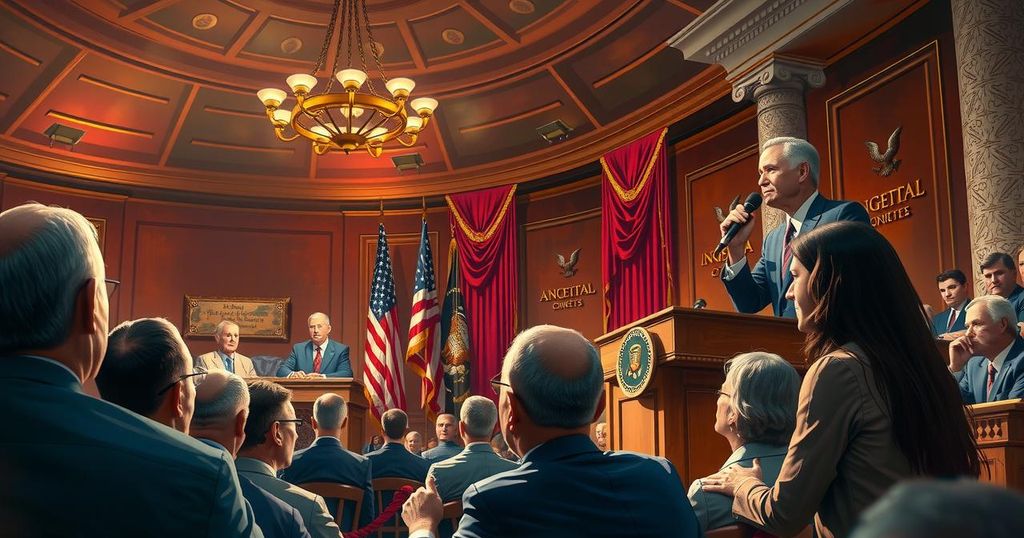World news
AFRICA, AMERICA, ASIA, BILL CLINTON, CANADA, CONGRESS, DEMOCRAT, EL, GAZA, GAZA STRIP, GEOPOLITICS, INTERNATIONAL RELATIONS, LESOTHO, NORTH AMERICA, OLLIE COOPERANDNARBEH MINASSIAN, RUSSIA-UKRAINE WAR, RUSSIAN INVASION OF UKRAINE, US PRESIDENTIAL RACE, VOL, WAR
David O'Sullivan
0 Comments
Trump Addresses Congress: Ukraine Minerals Deal and Economic Policies Take Center Stage
In his first address to Congress during his second term, Donald Trump asserted that Ukraine is ready to sign a minerals agreement and discussed economic tariffs as protective measures for America. The speech, lasting one hour and 40 minutes, was characterized by Trump’s assertions about his administration’s achievements and interactions with both supporters and dissenters in Congress.
In a significant speech to Congress, Donald Trump laid out his administration’s agenda, claiming Ukraine is poised to sign a minerals deal. This address, the longest of any president in history at approximately one hour and 40 minutes, covered various topics including tariffs and illegal immigration. Interestingly, Trump’s speech notably omitted any reference to the ongoing conflict in Gaza, which raised eyebrows among his critics.
Trump stated that Ukraine is ready to finalize a minerals deal “at any time, if that is convenient for you.” This agreement is seen as a means for Ukraine to share its resource wealth in exchange for U.S. support during the war with Russia. Just last week, tensions had risen between Trump and Ukrainian President Volodymyr Zelenskyy over the state of negotiations, making this announcement particularly noteworthy. Trump shared that Zelenskyy sent him a letter expressing readiness for peace negotiations.
His controversial remarks about tariffs were also in the spotlight. During his speech, Trump indicated that recent tariffs on Canada and Mexico are not just economic measures but represent a form of protection for “the soul of our country.” He admitted that such tariffs may cause “little disturbances” but expressed confidence in their long-term benefits for America. Many are questioning the potential impacts of these tariffs—something the economists and data analysts are keen to explore further.
Additionally, Trump revived past assertions regarding Greenland, stating that while the territory has the right to determine its future, the United States would welcome it into the fold. He insisted that the U.S. needs Greenland for national security and seemed both serious and irreverent about a prospective acquisition.
Amidst the political drama, Trump presented DJ Daniel, a teenage brain cancer survivor, as an honorary Secret Service agent, eliciting applause from the audience. This gesture was part of his attempt to humanize his image amidst ongoing partisan tensions.
The evening also included interruptions from Democrats, notably Rep. Al Green, who was ejected from the chamber after protesting Trump’s speech. Trump used this moment to underscore the partisan divide and implied that nothing he said would elicit a positive response from the Democrats present. Criticism of President Biden was not overlooked as Trump positioned himself against the current administration’s policies.
Amid cheers and chants of “USA” from his supporters, Trump claimed that “America is back” and asserted the rapid progress his administration has made since he took office again. Despite skepticism surrounding his assertions, his supporters remained enthusiastic throughout the address. Trump’s actions and comments provided fodder for further analysis on the implications of his administration’s policies and their reception.
Donald Trump’s recent address to Congress highlighted several pivotal points: Ukraine’s readiness to sign a minerals deal, the introduction of tariffs viewed as necessary for national protection, and his interactions with a teenage cancer survivor. The speech reflected the ongoing partisan divide, especially with interruptions from Democrats, while also showcasing Trump’s controversial remarks regarding Canada and Greenland. As Trump continues to navigate complex domestic and international landscapes, the impacts of his policies and rhetoric remain subjects of significant discussion and scrutiny.
Original Source: news.sky.com




Post Comment